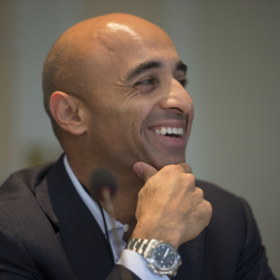
Otaiba on the Need for American Leadership in the Middle East
Writing for Foreign Policy, EWI board member Yousef Al Otaiba, UAE's Ambassador to the U.S., asserts the need for continued U.S. engagement in the Middle East. Despite the U.S. pivot towards Asia–and its focus on the current Ukraine crisis–there is a mutual interest in addressing regional security concerns and nurturing strong economic ties.
Read the full piece on Foreign Policy.
The Asia Pivot Needs a Firm Footing in the Middle East:
Why Washington can't afford to neglect its friends in the Gulf.
President Barack Obama heads to the Gulf this week at a time of major geopolitical turmoil, with events in Crimea and Russia dominating the headlines. None of this disorder is American-made, of course, and none will be solved by America on its own. But as the U.S. president will hear during his visit, American leadership is still as important to global stability and security as it ever was, and nowhere more than in the Middle East.
Recently, that leadership -- and the security partnerships that bolster it--have been tested and strained. Now facing ever more complex regional challenges from Egypt's transition to a potential nuclear deal with Iran, the president can use his meeting with Saudi King Abdullah this week to signal a new phase of engagement with Saudi Arabia, the United Arab Emirates, and other regional allies of the United States.
"Those who used to chastise America for acting alone in the world cannot now stand by and wait for America to solve the world's problems alone. We have sought--in word and deed--a new era of engagement with the world," Obama said in his 2009 speech at the United Nations. We welcomed that sentiment then and embrace it as enthusiastically now.
So what should this engagement look like today? It starts with a strong U.S. reaffirmation of our shared vital interests in the Middle East. It is a long and difficult "to do" list that includes containing the Iranian nuclear threat, challenging extremism and fighting terrorism, stabilizing Egypt, ending the violence in Syria, advancing an Arab-Israeli peace, and protecting energy supplies and international shipping.
It also requires better communication. At a working level, there is a constant and productive rhythm of cabinet-level meetings and senior official visits. But relationships in the Middle East are built on personal contact, and maintaining a candid and vibrant dialogue with regular leader-to-leader contact is essential.
For our part, we understand that the path forward is close collaboration with the United States and other regional allies. A strong partnership is essential. In meeting shared threats, we will share the burden. Gulf defense capabilities have improved dramatically, and we are committed to investing even more. Gulf states have a range of sophisticated U.S.-made defense equipment on order; they are jointly deploying advanced missile defense systems; and our militaries continue to train and operate closely together.
In the United Arab Emirates (UAE), we know also that a security partnership can only be strengthened by constant interaction. The UAE has proved its value and commitment both on and off the battlefield, alongside the United States. As a five-time participant in multinational peacekeeping coalitions, we have been fighting together for more than 12 years in Afghanistan, and in Libya we conducted joint air missions. Ongoing UAE-U.S. intelligence cooperation has disrupted illicit money and arms flows. And joint naval and air operations maintain freedom of navigation in the Gulf.
U.S. relationships in the Middle East, of course, are rooted in more than just shared security interests. There are ever stronger cultural and commercial ties. In 2013, Gulf states imported more than $50 billion in U.S. goods and services, and they have hundreds of billions of dollars invested in America. U.S. universities and cultural and medical institutions such as New York University, the Cleveland Clinic, and the Guggenheim have outposts throughout the region. And tens of thousands of our students are attending colleges throughout the United States.
In short, there is a lot that binds us together. And we have to continue to count on each other to meet the challenges and opportunities ahead in what is still the most dangerous of neighborhoods. As friends and allies, we may not agree on every issue or every tactic, but there are urgent initiatives that we can work on together that set the stage now for more positive developments later. These include: cooperating on an economic stabilization plan for Egypt, shutting down money flows to the extremist opposition in Syria, building governance capacity in Libya, and joint planning for the "day after" the Iran talks conclude -- deal or no deal.
When Obama visits, the president will be reminded that in the Gulf we still see the United States as an irreplaceable pillar of regional security. With unsteady neighbors, expansionist dreamers, and violent nonstate actors all around us, we cannot go it alone. We need friends; and no friend is more important to us than Washington.
In turn, the United States should know that we are eager and willing to contribute to our collective security interests. While the talk out of Washington continues about a "pivot to Asia," U.S. energy independence, and new budget priorities, very few in the Middle East truly believe the U.S. commitment is waning. Even so, it is important for the president to reaffirm America's sustained commitment to the region during his visit.
Yet we are realistic--all partnerships must adapt with the times. But we also know that the vital interests that connect us--the threat of aggression and terrorism, the benefits of trade and commerce, the values of peace and moderation--remain as strong today as ever before.

